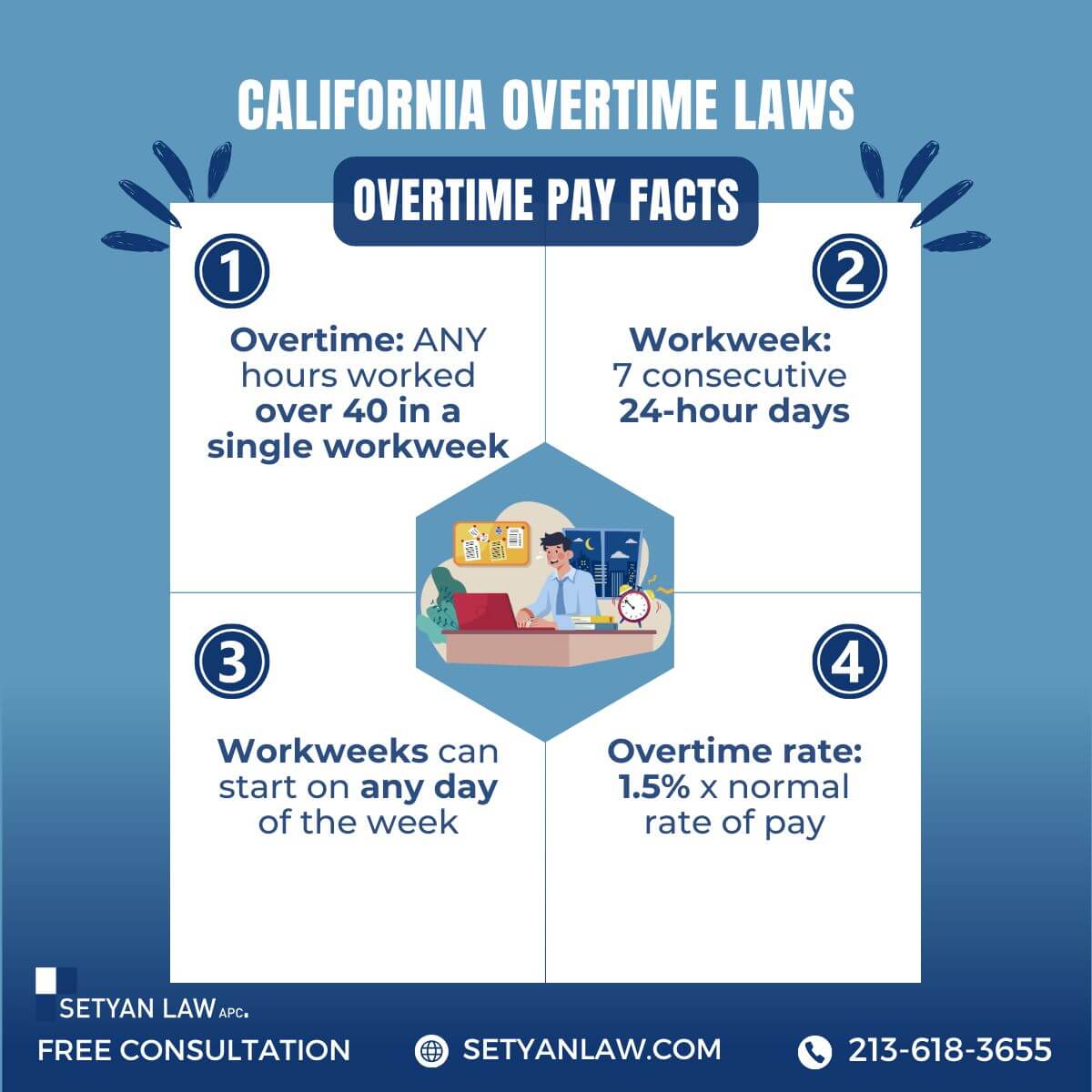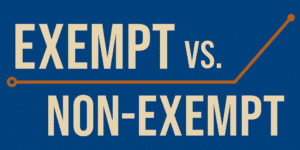Updated September 9, 2025
California Labor Code 510: Employee Rights & Overtime Regulations
California Labor Code 510 is a crucial piece of legislation that governs the rights of employees regarding overtime pay. This law is designed to ensure that non-exempt employees receive fair compensation for their work, particularly when they exceed standard working hours. Understanding the nuances of this law is essential for both employees and employers to navigate the complexities of labor regulations effectively.
Overview of California Labor Code 510
California Labor Code 510 establishes the framework for overtime compensation for non-exempt employees. Under this law, employees are entitled to receive one-and-a-half times their regular hourly wage for any hours worked beyond eight in a single workday or 40 in a workweek. Additionally, employees are entitled to double-time pay for hours worked beyond 12 in a workday or for any hours worked on the seventh consecutive day of work.
Key Provisions of Labor Code 510
- Daily Overtime: Employees must be compensated at a rate of 1.5 times their regular pay for hours worked over eight in a day.
- Weekly Overtime: Employees are entitled to overtime pay for hours exceeding 40 in a week.
- Double-Time Pay: Employees receive double their regular pay for hours worked beyond 12 in a day or for any hours worked on the seventh consecutive day.
These provisions ensure that employees are fairly compensated for their time and effort, particularly when they are required to work longer hours.
Exempt vs. Non-Exempt Employees
Understanding the distinction between exempt and non-exempt employees is vital in the context of California Labor Code 510.
Non-Exempt Employees
Most employees fall under the non-exempt category, meaning they are entitled to overtime pay as outlined in Labor Code 510. Non-exempt employees typically include those in hourly positions or those who do not meet specific criteria set forth by the law.
Exempt Employees
Certain employees may be classified as exempt from the overtime provisions of Labor Code 510. Exempt employees typically include:
- Executive Employees: Those who manage the organization or a significant department.
- Administrative Employees: Those who perform office or non-manual work related to management or general business operations.
- Professional Employees: Those who are licensed or certified in their field, such as doctors or lawyers.
Exempt employees are not entitled to overtime pay, which is a significant distinction that can impact compensation.
Alternative Workweek Schedules
California Labor Code 510 also allows for alternative workweek schedules, which can affect how overtime is calculated.
What is an Alternative Workweek Schedule?
An alternative workweek schedule is a work arrangement that allows employees to work longer hours over fewer days. For example, an employee might work four ten-hour days instead of five eight-hour days.
Legal Framework for Alternative Workweeks
To implement an alternative workweek schedule, employers must adhere to specific legal requirements, including:
- Employee Approval: Employees must agree to the alternative schedule through a secret ballot election.
- Written Agreement: Employers must provide a written agreement outlining the terms of the alternative schedule.
These schedules can provide flexibility for both employees and employers, but they must be implemented correctly to comply with the law.
Calculating Overtime Pay
Understanding how to calculate overtime pay is essential for both employees and employers.
Standard Overtime Calculation
For non-exempt employees, the calculation for overtime pay is straightforward:
- Regular Rate: Determine the employee’s regular hourly wage.
- Overtime Rate: Multiply the regular rate by 1.5 for hours worked over eight in a day or 40 in a week.
- Double-Time Rate: Multiply the regular rate by 2 for hours worked over 12 in a day or on the seventh consecutive day.
Example Calculation
Consider an employee who earns $20 per hour and works 13 hours in one day. The calculation would be as follows:
- First 8 hours: $20 x 8 = $160
- Next 4 hours (overtime): $20 x 1.5 x 4 = $120
- Final hour (double-time): $20 x 2 = $40
Total Pay for the Day: $160 + $120 + $40 = $320
This example illustrates how overtime pay can significantly impact an employee’s earnings.
Common Violations of Labor Code 510
Despite the clear guidelines set forth in Labor Code 510, violations can occur.
Failure to Pay Overtime
One of the most common violations is the failure to pay employees for overtime hours worked. Employers may mistakenly classify employees as exempt or fail to track hours accurately.
Misclassification of Employees
Misclassifying employees as exempt when they should be non-exempt can lead to significant legal issues. Employers must ensure that they understand the criteria for exemption to avoid potential lawsuits.
Lack of Alternative Workweek Agreements
Employers who implement alternative workweek schedules without following the proper legal procedures may face penalties. It is crucial to have employee consent and maintain accurate records.
Employee Rights Under Labor Code 510
Employees have specific rights under California Labor Code 510 that protect them from unfair labor practices.
Right to Overtime Compensation
Employees have the right to receive overtime pay for hours worked beyond the standard limits. This right is fundamental to ensuring fair compensation for labor.
Right to Challenge Violations
Employees can challenge violations of Labor Code 510 by filing a complaint with the California Labor Commissioner or pursuing legal action against their employer.
Right to Legal Representation
Employees have the right to seek legal representation if they believe their rights under Labor Code 510 have been violated. Consulting with an employment lawyer can provide valuable guidance and support.
The Role of Employers in Compliance
Employers play a critical role in ensuring compliance with California Labor Code 510.
Maintaining Accurate Records
Employers must maintain accurate records of employee hours worked to ensure proper compensation. This includes tracking overtime hours and ensuring that employees are classified correctly.
Providing Training and Resources
Employers should provide training for management and HR personnel on labor laws to prevent violations. Understanding the intricacies of Labor Code 510 can help employers avoid costly mistakes.
Implementing Clear Policies
Establishing clear policies regarding overtime and alternative workweek schedules can help employers maintain compliance and protect employee rights.
Seeking Legal Assistance
If you believe your rights under California Labor Code 510 have been violated, seeking legal assistance is crucial.
When to Consult a Lawyer
Consulting with an employment lawyer is advisable if you experience issues such as:
- Denial of overtime pay
- Misclassification as an exempt employee
- Lack of proper alternative workweek agreements
Benefits of Legal Representation
An experienced employment lawyer can help you navigate the complexities of labor law, advocate for your rights, and pursue compensation for unpaid wages.
Conclusion
California Labor Code 510 is a vital piece of legislation that protects the rights of employees regarding overtime pay. Understanding the provisions of this law, the distinction between exempt and non-exempt employees, and the implications of alternative workweek schedules is essential for both employees and employers. By ensuring compliance with Labor Code 510, employers can foster a fair and equitable workplace while empowering employees to assert their rights.
If you have questions about your rights under California Labor Code 510 or believe your rights have been violated, consider reaching out to a qualified employment lawyer for guidance and support. Your rights matter, and you deserve fair compensation for your hard work.
If you need employment litigation, call Setyan Law at (213)-618-3655. Free consultation.
Call Setyan Law at (213)-618-3655 to schedule a free consultation.






